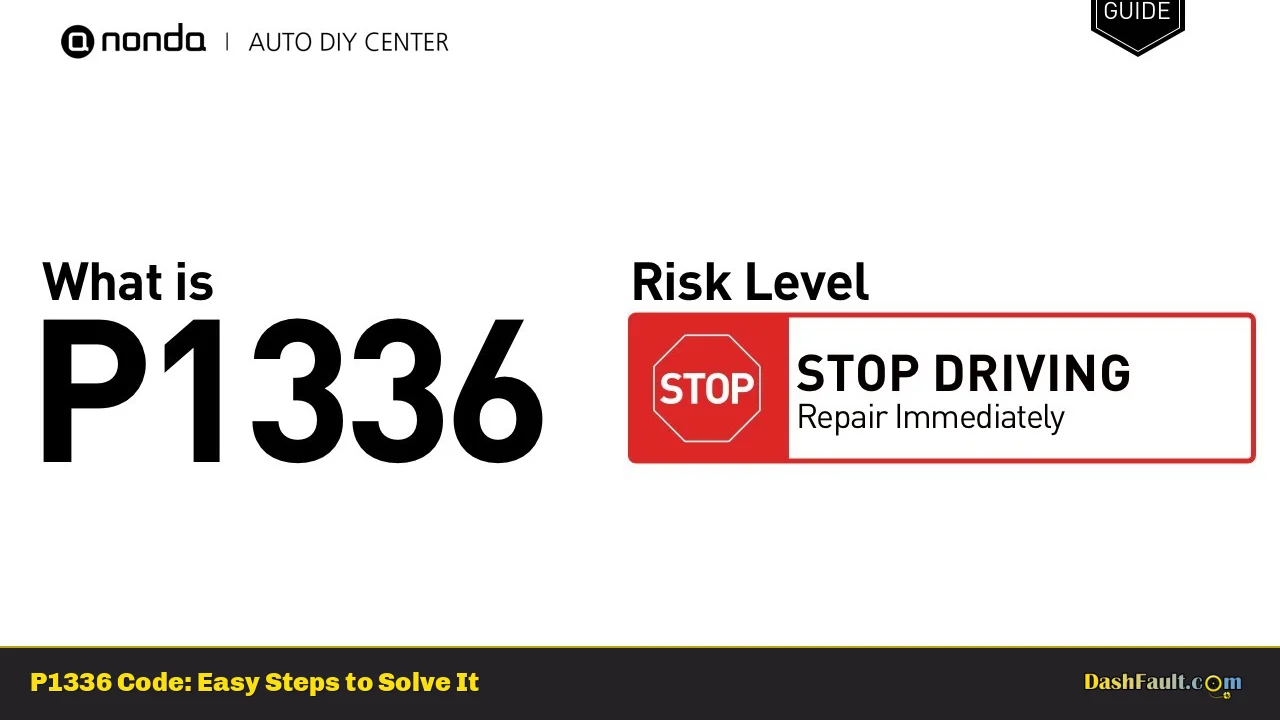The P1336 trouble code is a diagnostic trouble code (DTC) that indicates a malfunction within the Crankshaft Position Sensor (CKP). This sensor plays a critical role in monitoring the crankshaft’s rotational speed and position, which is essential for the Engine Control Module (ECM) to manage ignition timing and fuel injection. When the ECM detects an issue with the CKP, it triggers the P1336 code, signaling potential problems that could lead to poor engine performance or even failure to start.
| P1336 Code Meaning | P1336 Code Common Causes |
|---|---|
| Crankshaft Position Sensor Malfunction | Faulty Crankshaft Position Sensor |
| Signal Plate Damage Detected | Open or Shorted CKP Sensor Harness |
| Inconsistent Signal to ECM | Poor Electrical Connection in CKP Circuit |
| Potential Correlation Issue with Camshaft Position Sensor | Physical Damage to Signal Plate or Flywheel Teeth |
| Crankshaft Rotation Issues Affecting Sensor Readings | Faulty Starter Motor or Starting System Circuit Problems |
| Insufficient Battery Power Affecting Sensor Operation | Weak or Dead Battery |
Symptoms of P1336 Code
When the P1336 code is triggered, drivers may experience several symptoms indicating a problem with the crankshaft position sensor:
- Engine Stalling: The engine may stall unexpectedly due to a loss of synchronization between the crankshaft and camshaft.
- Difficulty Starting: The vehicle may have trouble starting, as the ECM relies on accurate data from the CKP sensor to initiate ignition.
- Reduced Engine Performance: Drivers might notice a decrease in engine power, especially during acceleration.
- Increased Emissions: A malfunctioning CKP can lead to inefficient fuel combustion, resulting in higher emissions.
- Check Engine Light: The illumination of the check engine light on the dashboard is a common indicator of trouble codes like P1336.
Technical Explanation
The Crankshaft Position Sensor is crucial for engine management. It typically consists of a magnet and a rotating disc with teeth that pass by the sensor. As the teeth move past the sensor, they create variations in the magnetic field, which generates voltage signals sent to the ECM. If there are issues with this system—such as damaged teeth on the signal plate or wiring problems—the ECM may not receive accurate data, leading to error codes like P1336.
Step-by-Step Diagnosis
- Scan for Codes: Use an OBD-II scanner to confirm that P1336 is present and check for any other related codes.
- Visual Inspection: Inspect the CKP sensor and its wiring for any signs of damage, corrosion, or loose connections.
- Check Signal Plate: Examine the flywheel or signal plate for chipping or damage that could affect sensor readings.
- Test CKP Sensor: Use a multimeter to test the resistance and output voltage of the CKP sensor according to manufacturer specifications.
- Inspect Camshaft Position Sensor: Since P1336 can relate to correlation issues with the camshaft position sensor, inspect that sensor as well.
- Battery and Starter Check: Ensure that the battery is fully charged and that the starter motor is functioning correctly.
Solution Methods
- Replace CKP Sensor: If testing reveals that the CKP sensor is faulty, replace it with a new one.
- Repair Wiring Issues: Fix any damaged wiring or poor connections found during inspection.
- Clear Codes: After repairs, clear any trouble codes using an OBD-II scanner and conduct a road test to ensure proper operation.
Cost Estimates
- CKP Sensor Replacement: The cost of a new crankshaft position sensor can range from $50 to $200 depending on make and model.
- Labor Costs: Expect labor charges between $75 and $150 per hour at most repair shops.
- Total Repair Costs: Including parts and labor, total repair costs can range from $150 to $500 depending on severity and required repairs.
Warnings and Recommendations
- Immediate Attention Required: A malfunctioning CKP sensor can lead to severe engine issues. It is recommended not to drive your vehicle until repairs are made.
- Professional Assistance: If you are unsure about diagnosing or repairing this issue yourself, it is advisable to seek help from a certified mechanic.
Frequently Asked Questions About P1336
- What does code P1336 mean?
The P1336 code indicates a malfunction in the Crankshaft Position Sensor, affecting engine timing and performance. - Can I drive my car with a P1336 code?
No, it is not safe to drive as it may lead to stalling or failure to start. - How much does it cost to fix a P1336 code?
The total cost can range from $150 to $500 depending on parts and labor. - What are common symptoms of a faulty crankshaft position sensor?
Common symptoms include stalling, difficulty starting, reduced performance, and illuminated check engine light. - Is replacing the crankshaft position sensor difficult?
It can be challenging depending on vehicle make and model; professional help may be necessary. - How can I diagnose a P1336 code?
Use an OBD-II scanner, perform visual inspections, check wiring integrity, and test sensor functionality. - What other codes might accompany P1336?
P0335 (CKP circuit malfunction) or codes related to camshaft position sensors may appear. - When should I seek professional help?
If you’re unable to diagnose or repair issues after basic troubleshooting steps.
In conclusion, understanding and addressing the P1336 trouble code promptly is essential for maintaining your vehicle’s performance and reliability. By following systematic diagnostic steps and seeking professional assistance when necessary, vehicle owners can effectively manage this issue without compromising safety or functionality.
